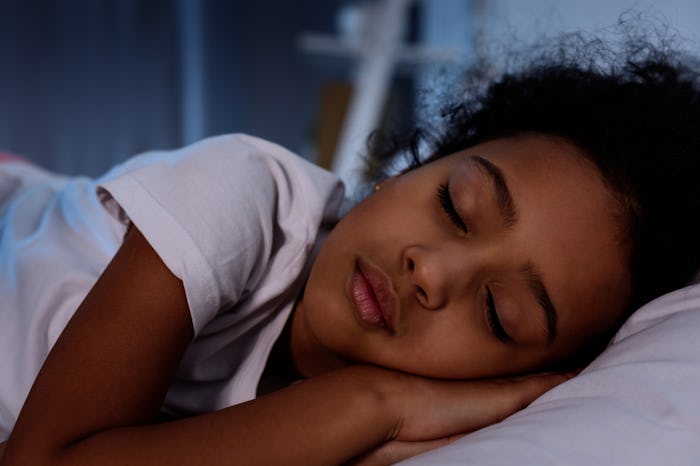Life
Kids With Regular Bedtimes May Be Healthier As Teens, According To New Research
Getting kids to sleep can be an event all by itself and, sometimes, the temptation to let them run around until they drop is strong. But not only do bedtimes mean parents can look forward to an expected break, it has real benefits for kids, too. According to new research, kids with regular bedtimes might be healthier as teens. Bedtimes may be a challenge, but they are might be well-worth implementing in your house.
Everyone knows that you need to sleep, but it can be easy for parents to forget just how much sleep little kids need. The general rule of thumb for adults is to get eight hours of sleep each night, but that may actually not be enough sleep when it comes to kids. For pre-school (3 to 5) and school-aged (6 to 13) kids, the National Sleep Foundation recommended that they get 10 to 13 or 9 to 11 hours of sleep, respectively.
Sleep helps kids' mental and physical development, as outlined by the National Sleep Foundation. Now, researchers at Penn State have also found that having a consistent, age-appropriate bedtime and receiving plenty of sleep from early-on in childhood may be important when it comes to healthy body weight in their teenage years, as reported by EurekAlert.
Researchers published their results in the Dec. 4 journal SLEEP. For the study, they classified groups of kids by bedtime and sleep routine and, as outlined by Penn State News, tested associations for the groups with teenaged body mass index (BMI). They analyzed data from the Fragile Families and Child Wellbeing Study, which included data from 20 U.S. cities, according to the study's abstract.
They found that about 33 percent of kids regularly went to bed at age-appropriate bedtimes for kids aged 5 through 9, according to Penn State News. The outlet also reported that kids who didn't have a bedtime routine when they turned 9 self-reported that they slept for shorter periods of time and had a higher BMI at age 15 compared to their peers who went to bed at an age-appropriate bedtime.
Study co-author Orfeu Buxton, professor of biobehavioral health at Penn State, said, according to EurekAlert:
"Parenting practices in childhood affect physical health and BMI in the teenage years. Developing a proper routine in childhood is crucial for the future health of the child. We think sleep affects physical and mental health, and the ability to learn."
Researchers also noted, according to EurekAlert, that bedtimes should include a "window". Most parents know that putting a kid to bed doesn't mean they actually go to sleep right away and that's fine! That just means parents need to try accounting for that.
Routines are really important for kids, because it helps them feel secure and also helps them develop self-discipline. They also help minimize power struggles and give kids a sense of ownership over their own daily activities, as outlined by Aha! Parenting.
These routines can include good night kisses, reading books, and regular hygiene aspects like bubble baths and brushing teeth, as outlined by the Alaska Sleep Clinic. They don't need to be the complete same from family to family, but they need to be consistent for each child.
To help implement a regular, battle-free bedtime, WebMD recommended that parents give their kids room to wind down and provide a transitional sleeping object, like a teddy bear.
Kids need to sleep, even if they don't always want to. By creating a consistent routine, parents make the process easier and have healthier teens as a result.
This first-time mom wants to have a home birth, but is she ready? Watch how a doula supports a military mom who's determined to have a home birth in Episode One of Romper's Doula Diaries, Season Two, below. Visit Bustle Digital Group's YouTube page for the next three episodes, launching Mondays in December.
